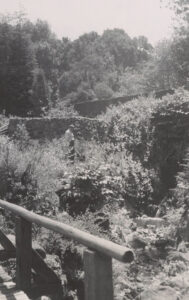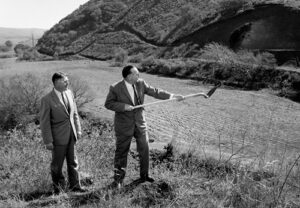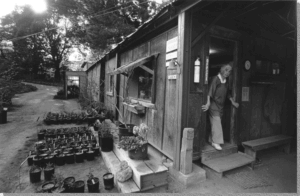By Ricky J. Noel
U.S. Forest Service, California Water History, and Horticulturalists in the Natural Resources, Land Use, and Environment Oral History Project
The UC Berkeley Oral History Center has a large collection of oral histories documenting the history of natural resources, land use and the environment within California and worldwide. The oral histories in the subject area record the experiences and reflections of individuals who have participated in some of the most impactful organizations within this field, such as the United States Forest Service, the East Bay Regional Park District. Additionally, this collection contains interviews detailing the history of the California wine industry, California water wars, forestry, and horticulture within the United States and abroad.
Forestry

One of the highlights in this expansive and broad collection includes several interviews with individuals from the early days of the United States Forest Service. The interviews detailing the history of forestry could be very useful to someone who wants to trace the evolution of the forestry industry. In addition, if one is working on something involving University of California history or the history of the U.S. Forest Service, particularly in the first half of the twentieth century, these interviews, among the many others present in the collection, would be an invaluable resource for that research.
My personal recommendations for this area would be an interview with Emanuel Fritz, who was a very early practitioner of the forestry field in the United States. He attended Yale School of Forestry and eventually made his way to the University of California in the 1920s, where he became involved with redwoods and assisted the U.S. Forest Service with their second-growth investigation along with other projects of that nature. He also discusses his political experience, particularly his involvement with the California Forest Practice Act of 1945 and his work as a consultant for the Legislative Forest Study Committee in 1944. Another recommendation would be our interview with Edward Kotok who was a researcher for the U.S. Forest Service as well as the assistant chief in charge of state and private forestry work. Some of the highlights of his interview involve him discussing his role as the assistant chief, relationships with Congress, ties between American and European forestry, arguing against the transfer of the U.S. Forest Service to the Department of the Interior, and helping to keep forestry at UC Berkeley.
Water

Another incredibly useful and relevant resource in this collection has to do with the history of the struggle over California’s water. Anyone interested or researching the history of California, the impact of the Los Angeles Aqueduct on the Lone Pine region, the California Water Project, irrigation, the United States government’s involvement with water in California and the evolution of the California Water Wars would do well to check out some of these interviews in this collection. Some of the ones I find most interesting and useful would be an interview with Frank Adams, a irrigation specialist who was the author of Bulletin 21, Irrigation Districts in California but also was part of the investigations into the irrigation of California from 1910 to 1924 and was involved in the redrafting of the Soil Conservation Act and the Central Valley Project. In regards to the California Water Project (1955–1961) there is an interview with a key developer of the project, Harvey O. Banks, who reflects on the development and financing of this endeavor, as well as his term as director of the California Division of Water Resources and his work on water-related legislation, such as the Davis-Grunsky, Burns-Porter and San Luis acts.
Horticulture

A unique aspect of this collection involves the interviews with horticulturalists. While these interviews might at first glance seem a bit niche in their focus, they offer valuable insights into small businesses in California, horticulture in California in the mid century, California regional history, and the development of plant societies such as the UC Berkeley Botanical Gardens. Interviews that stand out to me in this collection include Edward Carman who ran Ed and Jean Carman’s nursery beginning in 1946 and was an active member of the Los Gatos community, Wayne Roderick, a senior nurseryman for the UC Berkeley Botanical Garden from 1960 to 1976 and Gerda Isenberg, a humanitarian and owner of the Yerba Buena Nursery.
These interviews are among the many that are excellent resources for researchers looking to understand more about the environment, particularly the environment in its relation to conservation groups, water, and education. The Oral History Center’s Natural Resources, Land Use and the Environment – Individual Interviews is a collection of roughly a hundred interviews ranging from oral histories regarding the Sierra Club, United States Forest Service, California Wine Production, California Water Rights and the East Bay Regional Parks District, among many other unique, insightful personal commentaries that give insight into some of the most important aspects of the environment in the United States and abroad.
Find these interviews and all our oral histories from the search feature on our home page. You can search by name, keyword, and several other criteria.
Ricky J. Noel is a recent graduate of UC Berkeley, with a major in history with a Latin American concentration. During his time at Berkeley, Ricky worked with the Oral History Center as an editorial assistant.
Related Resources from The Bancroft Library
“Newton Bishop Drury and the Legacy of the Save the Redwoods League” by Deborah Qu.
Gerda Isenberg papers, 1931-1990. Consists of correspondence, writings, speeches, reports, interviews, subject files, clippings, a scrapbook, photographs and ephemera. BANC MSS 94/210 c.
Harvey O. Banks. Federal-state relations and the California water plan. Bancroft ; 1956?? ; F862.25.I49.
Emanuel Fritz papers, circa 1900-1988. BANC MSS C-B 728.
Forestry photographs from the Emanuel Fritz papers. BANC PIC 1987.057–PIC.
About the Oral History Center
The Oral History Center of The Bancroft Library preserves voices of people from all walks of life, with varying political perspectives, national origins, and ethnic backgrounds. We are committed to open access and our oral histories and interpretive materials are available online at no cost to scholars and the public. You can find our oral histories from the search feature on our home page. Search by name, keyword, and several other criteria. Sign up for our monthly newsletter featuring think pieces, new releases, podcasts, Q&As, and everything oral history. Access the most recent articles from our home page or go straight to our blog home.